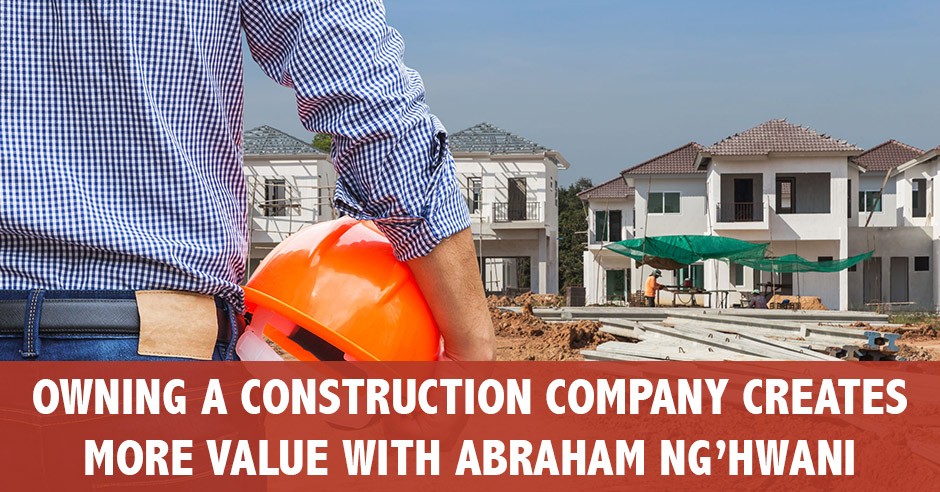Listen to the podcast here:
—
Watch the episode here:
Owning a Construction Company Creates More Value with Abraham Ng’hwani
Our guest on this episode is Abraham Ng’hwani. Thanks for being on the show, Abraham.
Thank you, Whitney. It’s great to be here.
Abraham founded Abranova, a full-stack real estate investment and construction development company two years out of college and turned $2.5 million in revenues in the first year. He single-handedly developed ground-up Treyburn Project and turned a 16% annualized return for investors. He’s working on a $25 million ground-up WeLive/WeWork mixed-use development project. He has aggregated at least $50 million in the projects pipeline in the next five years. Abraham, that’s a very impressive bio there and it’s impressive what you’ve done coming right out of college. I’m looking forward to getting into the show. Give the audience a little more about who you are, where you’re from, where you live, where you’re doing these projects at and let’s get into it.
I graduated as a Mechanical Engineer from Duke University. I worked for a company called Gilbane Building Company. It’s one of the largest construction companies in the US. About a year and a half into working for Gilbane, I saw the opportunity to venture into real estate development. At the time, I didn’t know what syndication was. I knew that from my experience of working in construction companies, investors are not the first priority. I saw an opportunity to create value for investors like streamlining construction efficiencies and creating value in terms of their return. There are many times in my company where I could have saved money for clients and it didn’t seem like it was the culture to think about how much more money can I put in an investor’s pocket. That was the birth of Abranova Real Estate and we are here to stay.
I want to elaborate on this. You’ve seen this value that you can create. In your bio, we mentioned full-stack real estate investment construction company. Can you elaborate on what that means?
The term full-stack means we are vertically integrated real estate investment and construction development company. We have a private equity network of investors who invest with us in our projects, which is what you would also call syndication deals. We’re also a licensed construction company. We handle all of our construction work. We have a team of high caliber construction managers with great experience in construction. We think of ourselves in every sense a construction company. We’re licensed but our focus is creating value for investors. Being full-stack allows us to streamline every stage of the buyer creation process and make a lot of decisions that most developers wouldn’t be able to make in terms of financing, how to put together the capital stack, how to avoid risk, including debt risks and all that. In a nutshell, that’s what it is.
[bctt tweet=”Being fully integrated means analyzing every trade. ” via=”no”]
Could you elaborate a little on how that works? How are you able to create the value because you have the construction ability as well? Give us maybe an example where that happened.
I will start with the Treyburn Project. Treyburn raised about $2 million. I handled pretty much all the GC work, the construction management part. In construction, you can save money in many different ways. When you’re doing a design-build project, there are many design choices that have direct cost implications. Even starting as the side of the choice of a site. We do ground-up projects and one site versus another cost the same in terms of acquisition. Just the topography, if you don’t do a 3D modeling, analyze the site, look at your technical reports and understand what’s underneath, you can save a lot of money by avoiding sites that are going to cost you a lot of money down the road to develop. That’s one stage. There’s an industry standard that had about 33 different trades in a construction project. Each one has its own cost.
Being fully integrated, we analyze every trade. We look at what is the market value for a dollar per square foot of construction, whether it’s site work or whether it’s concrete. We analyze every single trade and study the market. In the current market, construction prices are through the roof. Our advantage is going into the Nova RTP project, which is a substantial project. One of the costs that every developer is going to get hit on who’s doing a ground-up project is site work. Being nimble, we are going to have our own in-house site work company. We’re going to have our own construction equipment, our own stuff and we’re going to do the work. We’re going to be on a budget and that’s what a full-stack company can do that others can’t.
I’ve never heard that before, about the 33 different trades in a construction project. I can see where if you can automize every one of those details and every one of those trades and you’re not hiring somebody else, you can get the best bang for your buck out of every one of those trades or every job. As a licensed construction company, you’re able to do all these things in-house. Is this something you recommend to other syndicators that are developing projects as well? Is that something more of us should consider? Is it like, “If you’re going to do this specific thing, then yes but if it is, no?”
I compare that to the other industry. There are people like Elon Musk who are creating cars from scratch. There are car dealers whose specialization is to sell cars to the customer. We, being engineers and being very interested in figuring out how things work, streamlining efficiencies and even innovating. We see a lot of bad construction material that fails all the time. We’re thinking, “If we’re going to do this again, how can we make this better?” The Nova RTP Project is a project with the 21st-century customer in mind. People are buying Teslas. The average cars we drive is integrated with wireless technologies. You can pretty much do a lot of things that you wouldn’t be able to do a few years ago.
Your house, for most people, it’s probably the same as your grandma’s house. It’s nothing special except maybe new paint, maybe different type of window. If you’re able to have your car integrated with artificial intelligence technologies that people are used to as part of our life, we’re thinking in that direction. Not everybody has to build cars from scratch, going back to the auto industry, you can be a dealer and be successful. You specialize in selling cars but your success is going to depend on the success of the types of cars you choose to sell. Unfortunately, in construction, we don’t have a brand. We don’t have a Ford or a Tesla or a Toyota. You have real estate, a dollar per square foot.

At least to some extent, knowing how all the trades come together, where the most value is created, and being able to have some control in that, I think that’s what it’s going to set apart a successful syndicator and real estate developer from the other. In our case, every deal that we do has to be more efficient than the previous one. It doesn’t have to be everybody’s goal as long as you’re making money and you’re meeting your projected returns for your investors. For us, it’s more than that. We want to make sure we’re able to execute our deals as efficiently as possible every time.
If you’re learning something in every deal, then your next deal should be a little better. How do your investor relations differ on a deal like you’re doing as opposed to regular value-add multifamily or something like that? You already see the asset. Investors can walk in if they want. They can touch it, but in a deal like this or a development project, they can’t. They have a lot of trust in your ability. Tell me about that relationship and what that looks like.
I came from an investor meeting before this interview and within the hour, one investor pulled out a check and signed a $100,000 investment. We’re taking security deposits. He commits $100,000 within the hour. It’s very much based on trust and in some sense, understanding the market that they’re investing in. We’re in the triangle market. The good thing about real estate is it’s very tangible. People have a feeling of whether it’s a good market or a bad market. That is already a good ingredient as to what would attract the investors, but also the team. We meet with our investors, we talk to them, they know our credentials and they know our track record. Over time, it’s only going to get better. There’s definitely some work to put there when it comes to ground-up projects because they’re not just investing in the asset, they’re investing in your ability to make that vision come true.
You’re doing a ground-up project. The building’s not there yet. How do you explain to an investor like, “This is what it’s going to be?” How do you help them to see this even though they can’t see it yet?
It starts with modeling. We do a lot of portfolio modeling and understanding what the projected returns are. What does rock bottom look like? What does a good case look like? Once we’re comfortable with those numbers, then we get into the design aspect of it. We’re working with civil engineers and architects to design the project. Renderings help. We make good renderings to give people a visual impression of what the actual product is going to look like. At the end of the day, once that visual aspect is fulfilled for investors, you’re going to look at the numbers and what am I investing? What risk profile is there and what’s the reward? Confidence is everything. It’s not just for ground-up. Even in value-add opportunities, you can make a lot of miscalculations. You think you’re going to spend X amount on a property and you end up spending twice as much. For most people, they take that. Before you realize it, you can’t service your note and you’re in hot water. In our case, we have a lot of control including avoiding any debt risk in our projects.
You had mentioned the market and knowing the market. Even with investors, you mentioned they have a good feeling that it’s a good market and everybody loves that area. What about differences in if I’m developing a property as opposed to a value-add multifamily deal. What are some differences in the market that are there that I should be thinking about if I’m doing one of those as opposed to the other?
[bctt tweet=”People who are doing value-adds are having a hard time finding properties because the market’s demand is high.” via=”no”]
For value-add deals, in my experience, people are having a hard time finding those opportunities in the hot market. Any property that’s worth purchasing, why would the owners sell it? They would have to have certain reasons as to why they’re selling it. Otherwise, you’re going to be buying a property that’s run down so much that somebody would rather get rid of it and that’s your opportunity. Your opportunities are based on being able to do an improvement on the property enough to bring it back to its market value and create value for your investors there. In my opinion, people who are doing value-adds are having a hard time finding properties because the market is hot and demand is high.
Whereas for us, being nimble and being able to do construction projects when the situation calls for, we can pretty much do anything. We are also looking at a $12 million value-add opportunity in Raleigh. We have a partner putting in $9 million, we’re raising $3 million. Being nimble, we can look at any opportunity, whether it’s a value-add or it’s a ground-up. In this market, value-add opportunities are very rare and very hard to get. You’re probably going to pay over what the actual value is. Ground-up is where we see the opportunity and being able to control the construction cost is where your success lies.
Tell me a little about the structure of one of these deals. That’s pretty different than value-add multifamily. From a ground-up development and maybe how do you structure deals, what does that look like?
Our credit deal offering is 506(b) offering. We have different investor tiers but pretty typical. We have preferred returns, 8% to 10% depending on the investor tier. We have three tiers of investors. Class A investors who are investing $1 million or more have a higher projected return. It’s 19% to 25% annualized. Class B is 16% to about 20% annualized returns. The rest is 506(b) offering. I don’t think it’s very different in terms of structure, other than when we realize our revenues is when we sell. It’s a one and a half to two-year hold times. It’s relatively short because we’re building and selling and cashing out. The rest of the structures is not very different.
What about the capital raise? Do you raise the majority of the deal or more as opposed to financing value-add multifamily compared to what you’re doing?
So far, we’ve been very good at avoiding that risk in our projects. We’ve been raising 100% of the equity that we need. For the Nova RTP Project, we’ve found very innovative ways of not using debt but at the same time leveraging our experiences and connections in the industry. We have about 20% to 25% of the construction costs as business lines of credit. Here’s the funny thing that I learned in real estate is if a developer takes a loan and pays a construction company that uses the money to buy construction material that sits in a warehouse for a whole year. You don’t have to spend money upfront to get that maturity. If you’re purchasing a substantial amount, we negotiate with the materials suppliers. We say, “We have this big project here. It’s a very new project in Durham. Let’s agree on the payment terms. You give people 30-day or 60-day payment timeline, give us three to six months.”

It’s all about negotiations. That minimizes the amount of equity upfront that we have to raise and use towards the construction. It also gets us closer to the point of the project where we have revenues. We end up spending or paying back materials suppliers from the revenues of the sales. The good thing about ground-up projects is our sale is four to six months of construction. After that, you’re beginning to see revenues right away. That’s what makes it a lot easier to avoid any debt at all because we can phase it if we need to. We can leverage our relationships. We minimize the amount of equity that we need to raise and maximize return for investors and not that risk at all. If the economy crashes, we’re still able to complete our projects and sell.
I want you to go back to when you started Abranova. I want you to give some advice to somebody that’s getting started in this business. Maybe some things or anything you would have done different, or anything you wish you had known when you started the syndication development business.
One thing I’ve learned over time is when it comes to syndication, integrity is everything. Your word is your bond as they say. If you’re considering syndication, it’s a measure of character as well. If you can’t be truthful before getting into syndication, then it’s going to be difficult for you to be a successful syndicator if you haven’t learned how to keep your word. Because people trust you with the word that you give them and your reputation is going to build on that going forward. From personal experience, being a syndicator makes me a better person because I know that being truthful is very profitable so why be dishonest?
I appreciate that and I like the line too, “This business is a measure of character.” If you are not integrous, I wouldn’t think you’re going to be in the business very long or very successful. What’s been the hardest part of the syndication journey or process for you?
The hardest part is it takes time to build investor networking relationships. People are trusting you with their savings and their money. Even the wealthy people are cutting you million-dollar checks. One of our largest investors has about a $4 million commitment. That’s from one person. That’s a lot of money from one person. It takes time to build that level of trust where people can trust you with so much money. I guess the other challenge is building your knowledge base. I’m blessed to have a good team of MBAs. We can analyze anything. We can build a model for any decisions. It’s having a systematic way of making decisions and not making decisions emotionally. You need to have data and you need to consider all the different variables. If you have some education that should come naturally but making it part of your principle. Over time, it takes a while to imbibe that as part of your philosophy like you need to make data-driven informed decisions.
What are some ways that you’ve improved your business that we can all apply to ours?
[bctt tweet=”Your business is a measure of your character.” via=”no”]
It’s systemizing processes, systemizing how you analyze deals. Everybody builds a pro forma, in most cases. I think that’s a good start, having a model for your deals all the time. What most syndicators or developers don’t do is they build performance based on numbers that either they get from previous data or real estate brokers or whatever. You don’t have to be an engineer or an engineering company to understand what the actual market construction numbers are. Doing a little bit of legwork to see, “What are the electrical costs? What are the plumbing costs?” There are databases all over for things like that. Understanding construction material trends and being able to build your model with those metrics in mind and making sure you’re always in tune with the current market values of both construction and sales.
How do you stay in tune with the market?
You need to read a lot, read the news a lot and study data. There’s no one way of doing it. I will tell you what works for me. I read The Wall Street Journal a lot like the data and real estate aspect of things. As a company culture, every Friday we have a catch-up meeting with the team where we review every headline that’s related to real estate or the economy that happened during the week. We look at everything very closely. We look at what’s coming into the market. We learned about the Federal Reserve is going to knock down the interest rates down. That’s going to be good for our home buyers to feel optimistic. It’s also good for investors because the ten-year bond is not attractive. It’s going to be easy for us to raise capital. That’s one way we’re doing it.
The second is, as a company, we have a culture to read one book every month of successful real estate developers and look at where they failed. We’re studying William Zeckendorf. I’ve read a book on Sam Zell and all the big guys. We see what they did best, where they failed, and how we can make better decisions from their experiences and having a very data-centric approach. The government database has a lot of data on the economy looking at what happened in the past. It’s combining all the knowledge of business school and engineering school, understanding government policy and how that’s going to affect the economy in the future. It’s an ongoing journey but it has to be very intentional.
What’s the number one thing that’s contributed to your success?
There’s no one thing but if you’re asking me to use one word, it’s having great integrity and having a good team. I’m proud of those two things.
Tell us how you like to give back.
That’s one of our favorite parts. As a company, our goal is to establish a nonprofit foundation for our company. We have long-term and short-term goals. For 2019, we are going to be volunteering for charity avenues like Habitat for Humanity. Because we are a construction company, we like to help people with housing like going to areas where there is low-income, people who are less fortunate and helping them with their housing and doing renovations. Fixing things that you and I can easily get done by hiring somebody but for them, it’s year-long savings. Creating a budget and helping those people. Long-term, we want to build schools. We want to build social infrastructure focusing on developing countries, in places where people don’t have these things that we all take for granted here.
Abraham, you’ve been a great guest. I appreciate you elaborating on what’s the full-stack real estate investment construction and development company is. I don’t know of any other guest that has everything integrated like that, including your construction business as well. It’s a pleasure to have you on. Tell the audience how they can learn more about you and get in touch with you.
Our website is www.Abranova.com. You will learn about who we are as a team and what we’re about. We have a social media presence. If you want to write to me personally, it’s [email protected]. My phone number is (919) 597-0223. I’m based in Durham, North Carolina.
Thank you so much. I hope all our audience will contact you. I appreciate the audience being with us. I hope you will be with us in the next episode. Give us a rating and review. I hope you will go to the Facebook group, The Real Estate Syndication Show and also go to Life Bridge Capital so you can schedule a call with me as well. I’d love to talk to you and help you any way I can. We will talk to each of you soon.
Important Links:
- Abranova
- Gilbane Building Company
- Habitat for Humanity
- www.Abranova.com
- [email protected]
- The Real Estate Syndication Show – Facebook Group
About Abraham Ng’hwani

Love the show? Subscribe, rate, review, and share!
Join the Real Estate Syndication Show Community:



